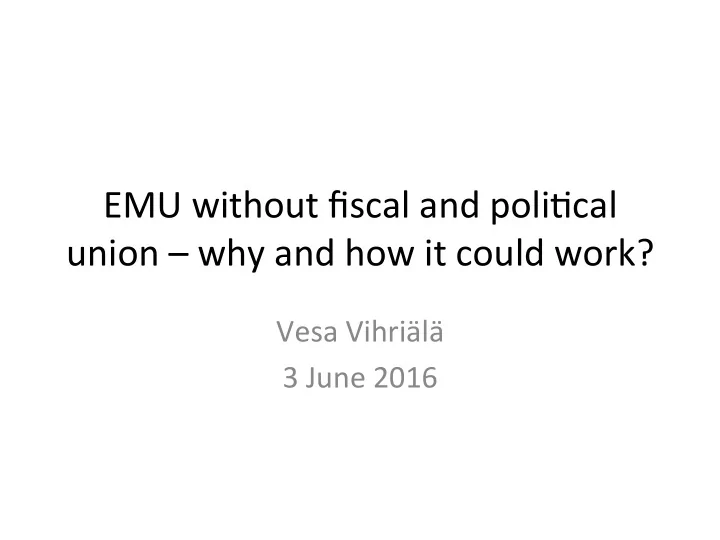

EMU without fiscal and poli3cal union – why and how it could work? Vesa Vihriälä 3 June 2016
The mainstream argument 1. Monetary union => fiscal union – Conjunctural differences => cross-country fiscal stabilisa3on needed in the absence of na3onal monetary policy – Efficient macro policy mix => joint fiscal policy stance – Threats to financial stability => risk-sharing, 3ght constraints on MS fiscal policy • Bank failures: fiscal backstops for deposit insurance, resolu3on • Sovereign debt crises: mutualisa3on of sovereign risk, more powerful constraints on MS fiscal policy 2. Fiscal union => poli3cal union (federal decision making structures) – Efficiency and legi3macy of joint fiscal decisions – Control of moral hazard
Yes, but… • Agree that – Fiscal union would improve the func3oning of the EMU – Fiscal union => poli3cal union • However, – Li\le appe3te for risk sharing among the likely providers of insurance – Even less appe3te for surrendering na3onal fiscal sovereignty, lack of will not limited to the financially strongest countries • Fortunately, a full-blown fiscal union probably not necessary
The unlikelihood of poli8cal union • Theory – poli3cal costs of providing public goods increase as a func3on the popula3on heterogeneity (e.g. Spolaore 2015) – fiscal policy inherently distribu3ve and subject to large differences of preferences • Prac3ce – Func3oning federal structures have taken long 3me to develop (USA!) – In the EU, risk sharing has been accepted only under extreme duress – MS (esp. the big ones) have protected their fiscal sovereignty fiercely • SGP 2003 • Valls 2014: “We decide the budget… France should be respected. It is a big country” • Renzi 2014: “We don’t take orders from Brussels” • The de-facto watering down of the new strengthened governance rules • Constraints only accepted when no feasible alterna3ve (financial assistance programmes) – The crisis has led to populist reac3ons and driven countries further apart
The non-necessity of full-blown fiscal union • Cyclical stabilisa3on across MS unlikely to be very important, according to the US experience – Most consump3on smoothing through capital and credit markets (Astrubali &co) – State-level pro-cyclical policies have largely undone the stabilising effects of the federal budget (Darvas; Aizenman & Parischa; Rodden & Wibbels) • The role of fiscal policy in the current crisis may be overstated – The US-EA difference less due to fiscal stance than monetary and financial condi3ons – Evidence on mul3pliers and spill-over effects mixed (In’t Veld, Holland- Portes). • Credible and efficient bail-in rules limit the need for fiscal backstops in the handling of banking and sovereign crises
What is needed in an EMU without fiscal union? • Unlimited supply of liquidity to solvent banks and sovereigns (elimina3on of self-fulfilling crisis expecta3ons) • An efficient resolu3on of solvency problems of banks and sovereigns • Effec3ve market discipline on sovereign indebtedness in the absence of effec3ve fiscal rules • Separa3on of bank and sovereign risks (elimina3on of the doom-loop)
What is also helpful for a func8oning EMU • Greater stabilisa3on of shocks via capital and credit markets • Greater labour market flexibility in MS • Greater labour mobility across MS • Be\er regula3on and supervision of banks and other financial ins3tu3ons
What could to the trick? • Comple3on of the banking union, including clarifica3on of the rules on fiscal risk-sharing; advancing of capital market union • Clarifica3on of the ECB financial stability mandate, including the op3on of financing ESM • Crea3on of a mechanism for an orderly sovereign debt restructuring, combined with a one-off “stock opera3on” to reduce debt burdens (Corsen et al.) • Further 3ghtening of financial regula3on – Restric3ons for banks’ sovereign exposures – More capital / less leverage (maybe steps towards less money crea3on as proposed by Lord King) – Stronger macro-pruden3al regula3ons
Why these might be doable reforms • Acceptance of financial stability as a EA public good, and the associated “ul3ma ra3o” risk sharing greater than of risk sharing in general • Banking and financial regula3on rela3vely more technical than poli3cal compared to taxes and expenditure • Bail-in principle already accepted for banks, thus why not for sovereigns; legacy debt a major challenge, though • Joint deposit insurance with a fiscal backstop together with restric3ons on banks’ sovereign risks a logical compromise
Similar argumenta8on • Corsen G. et al. (2016), Reinforcing the Eurozone and protec3ng an Open Society. • Eichengreen B. and Wyplosz C. (2016), Minimal Condi3ons for the Survival of the Euro. • Sandbu M. (2016), Europe’s Orphan. The Future of the Euro and the Poli3cs of Debt.
Thank you!
Recommend
More recommend